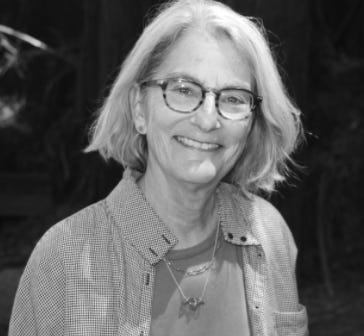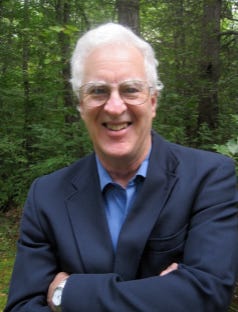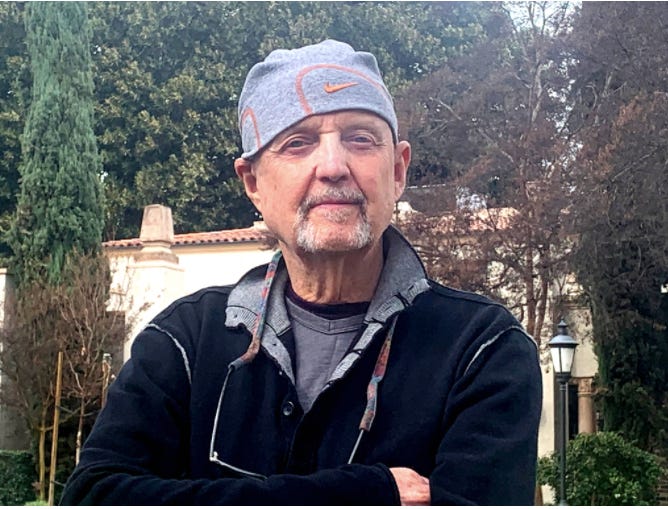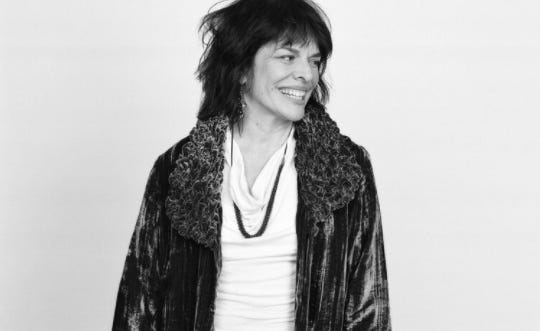Welcome! You’ve reached Spark. If a book club married a writer’s group, this community would be their child. Learn more here or just read on. If you received this from a friend, please join us by subscribing. It’s free! All you have to do is press the button below. Thanks for joining us!
So, what’s it like to be , you know, OLD???
It might surprise her now to learn this, but I still remember something my ex-mother-in-law once recounted to me on a visit when I was 19 and my son was still shy of his first birthday. We were sitting at her kitchen table and I was alternately trying to interest my son in a bit of food and moving dishes, glasses, books and other objects of interest out of his reach. My MIL must have been verging on her fifties and still had teenagers at home but one of her friends had just turned 80 and there was something she wanted to know.
“I found a quiet moment,” My MIL told me. “Then I asked, “What’s it like to be old, really old?”
I wish I could remember what her friend had told her; it is entirely possible that my son broke free and created chaos that interrupted us, or teenagers crowded in for lunch, or maybe I didn’t listen as closely as I should have; we were never close and I spent much of our time together in those days in defensive mode, afraid of her piercing intelligence, skill with words, and curiosity. I admired her for asking that question, though. I admired the way she blew past niceties and platitudes and seized the opportunity to learn about a subject with the power to unsettle: how to be old.
I wonder now if whatever she heard in reply to her question has proven to be true in her own life. I wonder if it is really something one person can answer for another.
I’ve been thinking about this again since finishing the collection of essays I mentioned last week, What Falls is Always: Writers Over 60 on Writing & Death which will be officially launched Tuesday, October 18th by publisher What Books Press and will be available for ordering later in the month. (I will update the links then and make sure it is in the Spark Community Recommendations page at bookstore.org.)
“But even if, looking back, it’s hard not to consider the body of writing that counts as at least part of what I have done with my life and think, is this all there is, the next thought is always, but what would I have done without it?” - Katherine Haake, What Falls is Always: Writers Over 60 on Writing & Death
The impetus for the book came from a panel organized by Katherine Haake and others for the 2019 Association of Writing Programs (AWP) conference held in Portland around the subject of writing, old age, and death. As Haake writes, she expected attendance to be small and even made plans to head out for drinks if no one showed up at all. Instead there was a standing-room-only crowd in a large conference room and not everyone in that room was over 60. The organizers began to wonder “what was this nerve we had touched?” This led to the collection of essays in which each writer considers what it means “not just to have lived, but also to have written for a very long time.”
Some of the essays are lyrical, some are funny, all are thoughtful. Most are deeply personal but several take a more academic, distant approach, informed by careers not just as writers but as teachers of writers who want to share what they’ve learned from literature or academic research. The strength of these pieces is, however, rooted in ideas and observations that feel true even if one is not a writer, even if one is not yet old. As I read, it seemed that the real question is one that we ask at every age we are, no matter what we do for work or how we cope with the choices we make and the ones that are made for us along the way: how to BE.
What do we hang onto?
What do we let go of?
How do we find peace when we find ourselves sidelined, sick, or separated from those we loved by death? Or caring for someone we love who is aging and sick? Or facing the devastation of climate change or a pandemic?
These questions rise throughout our lives but they loom larger when one reaches “the last third of life” -- that period between age 60 and 90+ which is getting a lot of attention now in books like Paul Zahl’s Peace in the Last Third of Life: A Handbook of Hope for Baby Boomers, or Jane Fonda’s Ted Talk, "Life’s Third Act.” Of course, they loom mostly for those of us with the time and resources to contemplate them -- getting old is, as many of the writers in this volume point out, a privilege.
Perhaps the most important aspect of this collection is that in order to write the essays, each writer had to sit with the question of aging, sit with the question of death in a way that most of us avoid.
For poet Gary Young, death is familiar -- being old is the surprise. He was dealt a fatal cancer diagnosis in his thirties. He wanted to spend his final days writing poems and moved to a cabin in the Santa Cruz mountains. He’s now in his 70s and has dealt with the return of the cancer several times while teaching and writing poetry. These days, he feels “as if I have carried my own death with me like a smooth stone cradled in my pocket. Sometimes I rub it for comfort.” He was lucky, he says, to learn at an early age that
“...death is always with us. It is waiting in the bus when we step off a curb; waiting in the blood test, and in the bad batch of drugs; waiting in our sleep; waiting to explore like fireworks in our brains.” - Gary Young
Two other writers found ways of getting to know death on more casual, approachable terms. In his poem “Your Date With Death,” Andrew Merton visualizes death as Wendy, a high school sweetheart. There is a dance, a “mannered waltz” then, later the poet asks shyly “What’s it like, being Death?”
“On good nights, she says
It’s like this,
And she kisses you hard.” - Andrew Merton
After nearly dying after a surgery gone wrong, Ron Koertge began to visualize death. During his long, off-and-on recovery, he kept seeing the “Grim Reaper” in his dreams and developed a sort of empathy for the the figure of death. He shares three poems that depict Death as a suburban family man with a tough job that is a “lonely business:” Death Takes a Shower, Mr. Death, and Death’s Dog. As Koertge recovered, the images of this figure has receded but he says, “I haven’t forgotten.”
Why, what, and how long?
As some of the writers feel younger writers pushing behind them or keep working in a culture that places a high value on youth, they find themselves examining why they write, what they write, and whether they should continue to keep doing it. Substitute just about any endeavor for “writing” and you have universal questions without easy answers.
Not surprisingly, most of the writers in this collection answer the “why” question with “why not?” When something has been central to their lives for so long and it is still possible to create sentences, then there is no reason to stop short of the ability to pick up the pen or strike the keyboard.
“Why give up your life? It’s interesting to me that this question of why write after 60 comes up. Certainly this is ageism on someone’s part or at least our response to it? - Christopher Buckley
Many note a shift in focus from the subjects that drew them when they were younger. Now, they report, they pay attention to their surroundings. There is a willingness and a desire to live more fully and bring that into their work.
“Maybe I’m sometimes rushing toward ground zero when I write or paint, but you can bet I will show attentive care when I engage in sex acts with my lover or step outside into nature, aware of the uneven ground beneath my feet. The once youth-favorite dark subject matters of nascent writing have now been exchanged for something new. Further complicating this ever-changing age-equation, I might then say that I no longer take Dostoyevsky’s anonymous Underground “pleasure of despair” with me home at night. I happen to be a happy person who sometimes is in love with discovering the beauty that survives from darkness.” - Elena Karina Byrne.
Others, however, acknowledge in various ways that their expectations have shifted -- they have had to release their grip on ambition and hopes that their work will live on after they are gone. There is freedom in this. As Michael Ventura puts it:
“Most of us writers, our words don’t outlive us by much -- and, very often, we live longer than they do. There’s nothing like tragedy in either fate. A truck driver is a truck driver only till the end of the drive…
“Writing is not what I live for, it’s how I live,” - Michael Ventura
I’m thinking hard about those questions — what to hang onto, what to let go of, how to find peace in my work and in my life. These questions were always there but they were suppressed by the urgencies of raising a child, making money, trying to figure out what to be when I finally grew up. There is comfort in knowing that I am not the only one and even if there are no answers in these essays, I’m reminded that these questions are ones we will spend a lifetime trying to answer.
Let me know - what do you think you want to let go of? Hang onto? What is your way of creating some peace in your life right now?
Old At Any Age
I love this new magazine edited by Sari Botton. Oldster Magazine explores “what it means to travel through time in a human body of any gender, at every phase of life.” In other words the magazine ignores all the tribal divisions instigated by marketers and economists who like to define and label each oncoming generation as it comes of age and focus on all of us who are traveling this road from birth to whatever comes next.
Coming up: Courtney Cook
I’ve made the acquaintance of Courtney Cook, the writer behind Survival By Book and I’m looking forward to introducing her to you next week. She’ll write a guest post for Spark and, the following week, I’ll write a guest post for Survival By Book. That’s the plan anyway. The plan also involves a taking some risks, pushing the envelope, showing some stuff I haven’t shown anyone before. I’m getting nervous already.
In the meantime, check out Courtney’s memoir, Socially Distanced, which you can enjoy free for one month.
That’s it for this week. What are you guys reading? Let me know - it’s been a while since we’ve had some of your books to share so tell me what’s in the stack by your bed or that list of books you want to read. We will list them on the Spark Community Recommendations Page over on bookshop.org along with any book mentioned here. Every sale helps local bookstores and, if we can raise enough, to support literacy programs.
If you know anyone who would like this newsletter, share away! Here are a couple of buttons to help you do that.
Gratefully,
Betsy
P.S. And now, your moment of Zen…just a little game of fetch
Calling for Your Contribution to “Moment of Zen”
What is YOUR moment of Zen? Send me your photos, a video, a drawing, a song, a poem, or anything with a visual that moved you, thrilled you, calmed you. Or just cracked you up. This feature is wide open for your own personal interpretation.
Come on, go through your photos, your memories or just keep your eyes and ears to the ground and then share. Send your photos/links, etc. to me by replying to this email or simply by sending to: elizabethmarro@substack.com. The main guidelines are probably already obvious: don’t hurt anyone -- don’t send anything that violates the privacy of someone you love or even someone you hate, don’t send anything divisive, or aimed at disparaging others. Our Zen moments are to help us connect, to bond, to learn, to wonder, to share -- to escape the world for a little bit and return refreshed.
I can’t wait to see what you send!
(And if you’ve gotten here, liked something, and still haven’t hit the heart below, now’s your chance! )











The subject of death comes up for me every single day working in Hospice. I have learned more about life working with death than anything else. And we were just at the funeral of my MIL last week. And her aging was fine, still working!, until a sudden decline at age 83. So the book should be interesting.